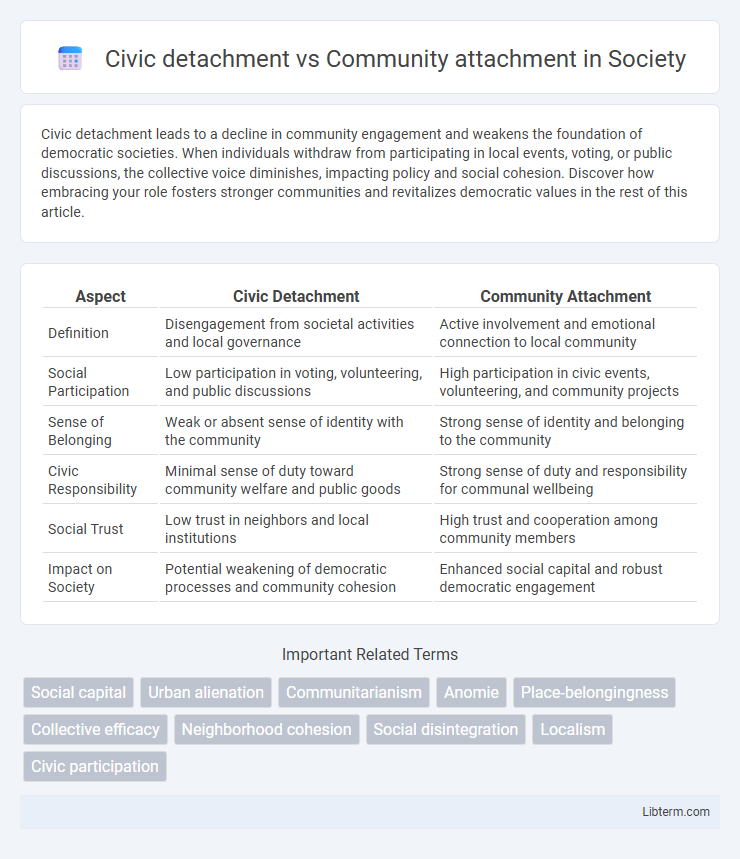Civic detachment leads to a decline in community engagement and weakens the foundation of democratic societies. When individuals withdraw from participating in local events, voting, or public discussions, the collective voice diminishes, impacting policy and social cohesion. Discover how embracing your role fosters stronger communities and revitalizes democratic values in the rest of this article.
Table of Comparison
| Aspect | Civic Detachment | Community Attachment |
|---|---|---|
| Definition | Disengagement from societal activities and local governance | Active involvement and emotional connection to local community |
| Social Participation | Low participation in voting, volunteering, and public discussions | High participation in civic events, volunteering, and community projects |
| Sense of Belonging | Weak or absent sense of identity with the community | Strong sense of identity and belonging to the community |
| Civic Responsibility | Minimal sense of duty toward community welfare and public goods | Strong sense of duty and responsibility for communal wellbeing |
| Social Trust | Low trust in neighbors and local institutions | High trust and cooperation among community members |
| Impact on Society | Potential weakening of democratic processes and community cohesion | Enhanced social capital and robust democratic engagement |
Understanding Civic Detachment
Civic detachment refers to a lack of emotional or practical engagement with local governance, resulting in diminished participation in public decision-making and reduced trust in political institutions. This phenomenon often correlates with lower voter turnout, limited community involvement, and weakened social cohesion. Understanding civic detachment requires analyzing factors such as socioeconomic disparities, perceived inefficacy of government, and social alienation that inhibit active citizenship and undermine democratic processes.
Defining Community Attachment
Community attachment refers to the emotional and psychological bonds residents develop with their local area, fostering a sense of belonging, pride, and commitment to its well-being. It involves strong social ties, active participation in neighborhood activities, and shared local identity, which contribute to collective efficacy and social cohesion. High community attachment often leads to collaborative problem-solving and sustained engagement in local development efforts.
Key Differences: Civic vs. Community Engagement
Civic detachment often refers to a lack of participation in formal political activities such as voting, attending town hall meetings, or engaging with governmental policymaking, whereas community attachment involves strong emotional bonds and active involvement in local social networks, neighborhood events, and informal support systems. Civic engagement emphasizes structured interaction with institutions and governance, while community engagement centers on personal connections and collective identity within a localized area. The key difference lies in the scope and nature of participation: civic engagement is institutionally oriented, whereas community attachment is relational and socially grounded.
Social Factors Influencing Civic Detachment
Social factors influencing civic detachment include economic inequality, lack of social trust, and limited access to inclusive community networks. When individuals feel marginalized or perceive local institutions as unresponsive, their participation in civic activities declines, increasing detachment. Conversely, strong social cohesion, equitable resource distribution, and effective communication channels foster community attachment and active civic engagement.
The Role of Belonging in Community Attachment
Belonging plays a crucial role in community attachment by fostering emotional connections and shared identity among members, which enhances social cohesion and collective well-being. Civic detachment often results in weakened social bonds and decreased participation in local activities, contrasting sharply with the strong interpersonal ties found in communities with high attachment. Research shows that individuals who experience a sense of belonging are more likely to engage in community support, volunteerism, and local governance, reinforcing the importance of belonging in sustaining vibrant, resilient neighborhoods.
Impacts of Civic Detachment on Society
Civic detachment erodes social cohesion by reducing public participation in democratic processes and weakening community bonds. When individuals disengage from civic duties, such as voting and volunteering, it diminishes collective problem-solving capacity and undermines trust in institutions. The decline in community attachment fosters social fragmentation, increasing vulnerability to misinformation and weakening societal resilience.
Benefits of Strong Community Attachment
Strong community attachment enhances social cohesion, fostering trust and cooperation among residents that contribute to improved public safety and collective problem-solving. Individuals deeply connected to their community experience higher psychological well-being, a sense of belonging, and greater participation in local governance and volunteer activities. This engagement strengthens local networks, supports economic development, and promotes resilience in the face of social or environmental challenges.
Overcoming Barriers to Community Involvement
Overcoming barriers to community involvement requires addressing factors that contribute to civic detachment, such as lack of trust in local institutions and feelings of social isolation. Strengthening community attachment can be achieved through inclusive programs that foster social cohesion, open communication channels, and provide accessible opportunities for participation. Research shows that when individuals perceive tangible benefits and experience a sense of belonging, their engagement in community activities significantly increases.
Promoting Community Attachment for Social Cohesion
Promoting community attachment fosters stronger social cohesion by encouraging active participation in local events, enhancing trust among residents, and creating a shared sense of belonging. Civic detachment tends to weaken social bonds, leading to decreased collaboration and increased social fragmentation. Initiatives such as neighborhood programs and inclusive decision-making frameworks effectively build community attachment and improve collective well-being.
Future Trends: Shifting from Detachment to Engagement
Future trends in civic engagement reveal a clear shift from widespread civic detachment to increased community attachment, driven by technological advancements and rising social awareness. Digital platforms and social media foster real-time interaction and collective action, enabling individuals to engage more deeply with local issues and governance. Emphasizing participatory democracy and community-driven initiatives, this transition promises stronger social cohesion and enhanced civic responsibility in urban and rural areas alike.
Civic detachment Infographic

 libterm.com
libterm.com